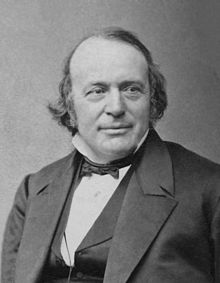Our website is made possible by displaying online advertisements to our visitors.
Please consider supporting us by disabling your ad blocker.
Louis Agassiz
Louis Agassiz | |
|---|---|
 | |
| Born | May 28, 1807 |
| Died | December 14, 1873 (aged 66) Cambridge, Massachusetts, U.S. |
| Citizenship | United States |
| Education | University of Erlangen-Nuremberg (PhD) University of Munich |
| Known for | Ice age, Polygenism |
| Spouses |
|
| Children | 3, including Alexander and Pauline |
| Awards | Wollaston Medal (1836) |
| Scientific career | |
| Fields | |
| Institutions | University of Neuchâtel Harvard University Cornell University |
| Doctoral advisor | Carl Friedrich Philipp von Martius |
| Other academic advisors | Ignaz Döllinger, Georges Cuvier |
| Notable students | William Stimpson, William Healey Dall, Carl Vogt,[1] David Starr Jordan |
| Author abbrev. (zoology) | Agassiz, Ag., L. Ag., Agass. |
| Signature | |
 | |
Jean Louis Rodolphe Agassiz (/ˈæɡəsi/ AG-ə-see; French: [aɡasi]) FRS (For) FRSE (May 28, 1807 – December 14, 1873) was a Swiss-born American biologist and geologist who is recognized as a scholar of Earth's natural history.
Spending his early life in Switzerland, he received a PhD at Erlangen and a medical degree in Munich. After studying with Georges Cuvier and Alexander von Humboldt in Paris, Agassiz was appointed professor of natural history at the University of Neuchâtel. He emigrated to the United States in 1847 after visiting Harvard University. He went on to become professor of zoology and geology at Harvard, to head its Lawrence Scientific School, and to found its Museum of Comparative Zoology.
Agassiz is known for observational data gathering and analysis. He made institutional and scientific contributions to zoology, geology, and related areas, including multivolume research books running to thousands of pages. He is particularly known for his contributions to ichthyological classification, including of extinct species such as megalodon, and to the study of historical geology, including the founding of glaciology.
His theories on human, animal and plant polygenism have been criticised as implicitly supporting scientific racism.
- ^ Nicolaas A. Rupke, Alexander von Humboldt: A Metabiography, University of Chicago Press, 2008, p. 54.
Previous Page Next Page


